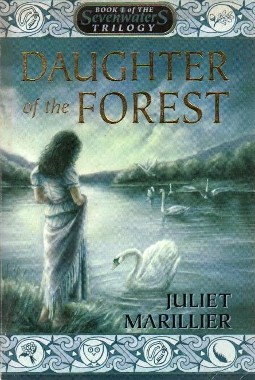| Juliet Marillier’s Daughter of the Forest, book one of three in the Sevenwaters Trilogy, draws on the Child of Lir legend and The Six Swans story to create an interesting, character-driven historical-fiction novel. Protagonist Sorcha begins as somewhat of a tomboy because of her father, Lord Colum of Sevewaters’, preoccupation with war, her deceased mother, and her six older brothers’ adventurous influence. Following in her mother’s footsteps, she practices healing. When Colum becomes enamoured with the Lady Oonagh, who Sorcha and her brothers sense dark intentions in, Oonagh turns her brothers into swans and curses Sorcha. Sorcha escapes and learns from the forest ancients that she can reverse the spell if she doesn’t speak during the time it takes her to sow together six vests from the thorniest of reeds. She undergoes much pain and mistreatment until Red, a Briton, captures her and takes her back to Harrowfield. There, Sorcha continues her silent sowing, despite the society’s disapproval. Yet, during this time, she forms a relationship of mutual respect with Red as she endeavours to save her brothers and Sevenwaters. Marillier’s well-written prose creates a believable world rich with Celtic folklore and practices. Her descriptions lushly portray the locations, characters, and inner anguish of a protagonist who, for most of the novel, must deny herself of the things she wants most. Marillier’s development of Sorcha and Red’s relationship is achieved subtly but believably through the eyes of a protagonist inexperienced in the ways of the world. Throughout the story, she depicts both the best and worst in humanity, and, through Sorcha’s actions, reveas the enduring nature of the human spirit and how love can help people cope with even the most harrowing experiences. Overall, although Daughter of the Forest is a little long in places, it is a very engaging and touching story. Recommended for fantasy fans. 3 1/2 stars |
|
0 Comments
|
Archives
July 2023
Categories
All
|


 RSS Feed
RSS Feed
